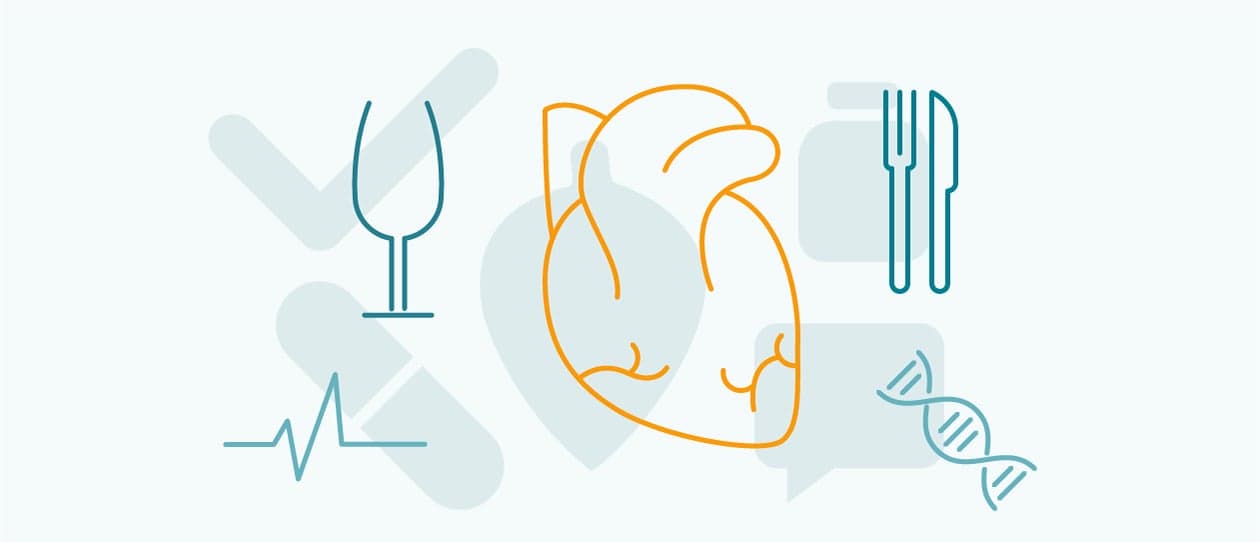
- Health hub/
- Heart & circulation/
- Cholesterol


High cholesterol levels are asymptomatic, and in many cases the first sign of any problem is a serious health issue. To help reduce the risk of this occurring, cholesterol levels are measured by a simple blood test. Your healthcare professional can organise this for you, along with other measurements of your cardiovascular health, such as blood pressure testing.
Cholesterol is transported through the blood stream in particles known as lipoproteins . The two most important varieties of lipoproteins to be aware of are low-density lipoproteins (LDL) and high-density lipoproteins (HDL).
High levels of LDL-cholesterol can lead to fatty deposits in the artery walls referred to as atherosclerosis, or "hardening of the arteries". Atherosclerosis makes the blood vessels narrower and stiffer, and consequently increases the risk of heart disease and stroke. This form of cholesterol is sometimes referred to as "bad" cholesterol.
High-density lipoproteins (HDL-cholesterol) help to reduce the risk of heart disease as they have the ability to help remove excess cholesterol from the arteries and other parts of the body. For this reason they are sometimes referred to as "good" cholesterol.
The narrowing of the arteries associated with high cholesterol levels can sometimes cause symptoms of chest pain (angina) or leg pain intermittent claudication, especially with exercise.
High production of cholesterol by the liver may contribute to the development of gallstones, symptoms of which include episodic abdominal and back pain, especially after consumption of fatty foods.
Cholesterol levels in the blood depend on both dietary factors and the amount of cholesterol manufactured by the body. High consumption of saturated fat, trans fat and cholesterol in foods may make your total cholesterol and LDL cholesterol levels rise.
Genetics also play a role in some people with high cholesterol. Your genes will partly determine how much cholesterol you naturally produce. Familial hypercholesterolaemia is more likely to be present in people who experience a heart attack at an early age or who have a family member who had a heart attack at an early age.
Being overweight contributes to increased LDL-cholesterol.
Other blood markers that may be associated with high cholesterol levels and are also risk factors for cardiovascular disease include high levels of a compound called homocysteine and high blood levels of triglycerides (fats).
Free radical damage to cholesterol molecules is believed to increase their ability to damage blood vessels.
- Remember that cholesterol is not a disease in itself, but an indicator of the risk of developing heart disease. Your healthcare professional will consider your cholesterol level in the context of other risk factors such as your family history, blood pressure, level of physical activity and whether you are diabetic or smoke cigarettes.
- To help maintain healthy cholesterol levels, reduce the quantity of cholesterol and saturated and trans fats in your diet. This involves avoiding animal fats (meat and full-fat dairy products) and sources of hidden fat such as pastries and pies.
- At the same time, increase the amount of fish in your diet (but not deep fried fish), and eat more fruit, vegetables and whole grains.
- A diet high in soluble fibre is highly recommended in order to promote the excretion of cholesterol. Good sources include legumes, oats and psyllium.
- Eating moderate amounts of foods that contain monounsaturated fats may support the management of healthy normal cholesterol levels. Important foods to include in your diet include nuts (especially walnuts), seeds and olive oil.
- Garlic and onion have cholesterol-lowering properties and are valuable additions to your diet.
- Limit your alcohol consumption to 1-2 standard drinks per day, and avoid binge drinking.
- Quit smoking. Cigarette smoking significantly increases the risk of developing cardiovascular disease and other health problems, and can exacerbate the negative effects of high cholesterol levels.
- Regular aerobic exercise can be of benefit to those with high cholesterol levels. Aim for at least 30 minutes of brisk walking per day. Always seek the advice of your healthcare professional before commencing an exercise programme.
- If you are overweight, talk to your healthcare professional about ways to address this, as being overweight may contribute to raised LDL and triglyceride levels.
- Your cholesterol level is only one aspect of your cardiovascular health profile and should be addressed in conjunction with other risk factors. Talk to your healthcare professional for more information.




